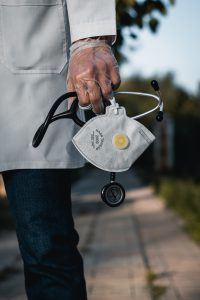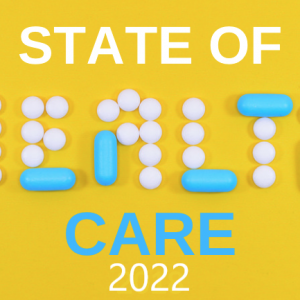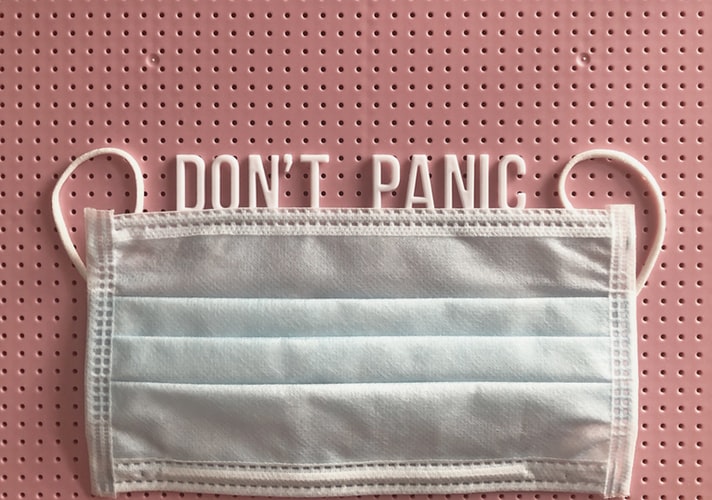It looks like COVID-19 will be with us for a while longer, probably many years if we continue the way we are going.
Nationwide there is significant variation in both the COVID vaccination rate and the number of new COVID-19 cases. A recent increase in the number of cases, doubling or tripling in some areas, occurred in unvaccinated individuals due to the Delta variant. The Delta variant is currently the most contagious form and makes up 98.8% of new COVID cases. In response to this vaccinations have increased in some, though not all, areas. While the COVID infection rate is decreasing in areas with higher vaccination rates and the rate continues to increase in areas with lower vaccination rates, the overall rate may be leveling off for the moment.
When comparing COVID vaccination and infection rates, there seem to be two different Americas: one usually urban/suburban and/or liberal areas where risk is low due to high vaccine rates vs. mostly rural and/or conservative areas where risk is high due to low vaccine rates. 45-57% of adults in conservative areas have received at least one vaccine shot compared with 62-76% in liberal areas.
There is also a disparity based on race/ethnicity with white (50%) and Asian (67%) Americans having a higher vaccination rate than Black (40%) and Hispanic (45%) Americans.
There is a clear relationship between a state’s COVID-19 death rate and its overall vaccination rate. The lower the vaccination rate, the higher the COVID hospitalization and death rate.
The coronavirus vaccine has become a political issue for many since it seems that political leaning (Republican vs. Democrat) has an impact on vaccination rates. Maps comparing the electoral college map from the 2020 election to vaccination rates clearly shows that all Democratic states have a vaccination rate above 70% while all Republican and swing states have vaccination rates below 70%.
Many who are unvaccinated are taking their cue from political leaders and not public health officials. Despite the rise in caseloads and deaths, many Republican politicians have not whole-heartedly endorsed vaccination despite being vaccinated themselves.
There are highly effective vaccines available freely to virtually any American 12 years old or older who wants one. It’s a shame that we have the means to end the pandemic but choose not to use it effectively. It’s even more frustrating that what should be a public health issue has become so political.
Although the coronavirus vaccines and proven protective measures (such as social distancing and masks) could hasten the end of the COVID-19 pandemic, it seems that this country has chosen the hard road to herd immunity and all that entails, which could include:
- More people with serious side-effects, like a nerve disorder, blood vessel clots, serious illness requiring hospitalization, prolonged COVID symptoms lasting 12 weeks or more (up to 50%), and severe long-term organ damage;
- The persistence or renewed need for shutdowns, restrictions, social distancing, wearing face masks in public and at large gatherings, and the dilemma about sending our children to school without a good solution;
- An increase in the number and severity of COVID-19 infections in children;
- A decline in the number of healthcare workers as they succumb to burnout, which is a significant issue in the already stressed and depleted healthcare system; and
- Continued resentment toward COVID-related shutdowns and restrictions,the unvaccinated, anyone who will not wear masks or practice social distancing to protect others, and the politicians still in denial.
If we are to change course and take an easier and much shorter road to herd immunity, there are six major roadblocks we need to recognize and overcome.
Roadblocks to Ending the Pandemic
The six major roadblocks to eradicating COVID are vaccine hesitancy/resistance, inequity in vaccine access, the initial lack of full FDA approval of the vaccines, not acknowledging the effect of individual actions on the well-being of others, the spread of misinformation by the news outlets and on social media, and politicians discouraging proven measures and recommending unproven ones.
1 – Vaccine Hesitancy/Resistance
Vaccine hesitancy/resistance is a very complicated issue with some legitimate concerns, mostly around side-effects and safety. Like many issues in medicine there is a component of mistrust toward medical providers, pharmaceutical companies, and government regulators. Many don’t understand or believe the risk. For others it is not a priority when compared to other issues in their lives, such as gun violence. Older children may face additional roadblocks if their parents object to vaccination.
Unfortunately much of it is based on misinformation and conspiracy theories that have become a religious, political, or otherwise polarizing issue in the United States.
At this point in our country, despite adequate COVID vaccine availability, there are a significant number of unvaccinated or incompletely vaccinated people, many of whom are by choice. In fact, the number of people who have said they will not be vaccinated will prevent the development of herd immunity any time soon, unless more people change their minds or a lot more people develop COVID infections.
Since the Delta variant is more contagious, the bar to herd immunity is now even higher; at least 90% of us need to be vaccinated or recover from a COVID infection. Some experts predict that herd immunity can be reached by spring 2022 if there is almost universal acceptance of the vaccine; it is unlikely this country will even come close to that. Other experts wonder if it is possible at all, since the Delta virus is so contagious and the vaccine is not 90% effective at preventing spreading and/or COVID disease.
Maybe the new public service announcements by leading U.S. professional groups for hospitals, doctors and nurses and Fox News, and increasing Republican endorsements will help boost this number.
2 – Inequity in Vaccine Access
Vaccine availability is not a problem in the United States as a whole, but there are underserved populations within every state. Communities of color are often underserved with transportation and internet access, and not adequately provided information on how to get vaccinated. There have been many reports of non-resident white people making appointments in areas serving Black people or other minorities, where resident non-white people are often not able to get time off from work or caregiving to get to an appointment or recover from side effects.
There are a significant number of people who can’t be immunized or who don’t develop protection from the vaccine or the infection due to problems with their immune system. In addition, there is currently no COVID vaccine for children under 12 years old.
While other richer countries have adequate amounts of the COVID vaccine available, many low resource nations have little access to vaccines, some as low as 1.3%. While the vaccines may control some local/countrywide COVID epidemics, it will have little effect on the global pandemic.
3 -The Emergency Use Authorization Status of the Vaccines
The Food and Drug Administration (FDA) approved the Pfizer vaccine on August 23, 2021. The shots from Moderna and Johnson & Johnson are still not formally approved and only have “emergency use authorization.” This is a temporary form of approval that allows qualified individuals to receive shots while their effectiveness and safety are still being studied.
Only now can the military, educational institutions, and other organizations require vaccinations. Although these schools, colleges, and businesses may be able to take definitive measures to prevent the spread of COVID at their institutions, it will take a while to implement and they may still need to get through legal hurdles, such as state laws banning vaccine mandates.
Despite the approval of the Pfizer vaccine, the emergency use authorization had already sent a message of uncertainty and skepticism to those who have not yet gotten a shot that continues to increase their reluctance to be vaccinated.
4 – Failure to Recognize the COVID-19 Pandemic as a Public Health Risk That Everyone Has an Obligation to Help With
The current measures to prevent the spread of COVID may be inconvenient at best, and in many cases downright difficult. Unfortunately, the consequences of not doing them are significant, for you as well as many others.
What is often overlooked when it comes to any public health issue is that it’s not just about individuals. An individual’s actions can have a major impact on the well-being of others. For COVID-19 this means that the decision to remain unvaccinated, go unmasked, and not practice social distancing is not just an individual choice, it puts others at risk. This is especially true for those with compromised immune systems and younger children who will continue to be ineligible for vaccination for many months, even though COVID (including the Delta variant) is often mild for children.
The Constitution was not written with pandemics in mind and while it does guarantee individual freedoms, this shouldn’t take precedence over the obligation of doing what is best for other citizens and the country. Even if your state has banned mask mandates, it is important to recognize that wearing masks is not intended to compromise your individual freedoms, but to protect your fellow citizens.
5 – Social Media Misinformation and Conservative News Media Encouraging Mistrust of the Vaccines
The U.S. Surgeon General Vivek Murthy and President Biden have recently called on social media platforms to try and minimize the amount of COVID-19 vaccine misinformation being spread by them. Although there is much more authoritative information about COVID-19 and vaccines on these sites, many people are still being drawn to the misinformation and not being vaccinated.
Although a few conservative news media hosts have recently encouraged viewers to take the ongoing pandemic seriously, many actively urge viewers to mistrust the vaccines. What is sad is that for many it is merely a ploy to discredit the current administration.
6 – Politicians Discouraging and Criticizing Face Masks and Vaccines, and Promoting Unproven Remedies for Political Gain
Many states now have laws banning mask and vaccine mandates, proven means of preventing COVID spread, by passing it off as an infringement on individual rights, as mentioned above.
Even worse is politicians’ endorsement of unproven remedies, such as ivermectin and hydroxychloroquine, including at least one who is a physician and should know better.
The Future Face of Coronavirus
The form that COVID persistence will take will vary depending on the response to COVID and global and local circumstances.
 The longer the COVID-19 epidemic persists, the more potential there will be for the development of new variants, such as the Delta variant described above, the new Lambda variant, and other variants surfacing around the world. Especially concerning is the fact that these variants seem to be easier to spread, may result in more serious symptoms, and may be less effectively prevented by the current vaccines, such as the Pfizer and Johnson & Johnson products.
The longer the COVID-19 epidemic persists, the more potential there will be for the development of new variants, such as the Delta variant described above, the new Lambda variant, and other variants surfacing around the world. Especially concerning is the fact that these variants seem to be easier to spread, may result in more serious symptoms, and may be less effectively prevented by the current vaccines, such as the Pfizer and Johnson & Johnson products.
With the large number of people still susceptible to the SARS-CoV-2 coronavirus and the development of newer variants, there are a number of ways COVID will persist if the roadblocks are not removed including a continued pandemic, seasonal epidemics similar to the flu, and/or local outbreaks. In many areas without access to the vaccine the virus will eventually run out of people to infect, but the cost will be high in terms of chronic complications and deaths.
It’s long past time to recognize that COVID-19 is a real and serious problem and the measures needed to combat it are proven medical measures whose benefits far outweigh any risks, not threats to our individual freedoms. It will truly require a group effort with all hands on deck to put an end to the coronavirus epidemic sooner rather than later.
The NeedyMeds website has a database of over 100 nationwide resources for those who have been impacted by COVID-19. For those looking for information on receiving a coronavirus vaccine, search online for your state’s requirements, area’s locations, and appointment availability. There may be options for children ages 12-18 to get vaccinated even if their parents don’t grant permission.





